|
|
|
Sort Order |
|
|
|
Items / Page
|
|
|
|
|
|
|
| Srl | Item |
| 1 |
ID:
161538
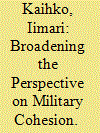

|
|
|
|
|
| Summary/Abstract |
It is difficult to underestimate the importance of cohesion for armed groups or organizations specialized and engaged in organized violence. This article argues that the recent debate on military cohesion has been far too narrow as it focused on Western state militaries during the 20th and 21st centuries, and even then only on the microlevel. It is necessary to broaden the perspective in order to construct theories that encompass even the vast majority of armed groups—the non-Western, nonstate, and nonmodern. This article advocates two ways of doing so: the investigation of cases that belong to these three types and broadening analysis to two new levels of analysis—the meso-level of armed groups and the macro-level, which contains state and society. Cohesion is established through harmonizing these three levels, which necessitates including them in the analysis in the first place.
|
|
|
|
|
|
|
|
|
|
|
|
|
|
|
|
| 2 |
ID:
161544
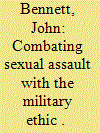

|
|
|
|
|
| Summary/Abstract |
This article explores sexual assault within the military by focusing on the role of norms and institutional culture. This article asserts that poor impulse control is, in part, at the root of sexual assault offenses. The “military ethic,” however, provides a promising institutional means to stigmatize sexual assault and further acculturate service members into law-abiding norms. The military ethic exalts obedience and self-sacrifice. The military ethic is theorized as a norm that may challenge or alter the attitudes and characteristics underlying sexual assault. Additionally, the question of whether the military fosters an institutional “culture of rape” is analyzed. Research into offenders’ motives is discussed, with a focus on the significance of self-control in offending conduct. Research on the features of successful preventive programs is considered. The article concludes by proposing a norms-based preventive policy targeting offender attitudes and capitalizing on successful preventive programs.
|
|
|
|
|
|
|
|
|
|
|
|
|
|
|
|
| 3 |
ID:
161543
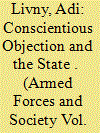

|
|
|
|
|
| Summary/Abstract |
The abundant writing on conscientious objection (CO) had kept one significant actor rather neglected—the state. Relatively unexplored is the question of how democracies shape their policies toward CO. This article wishes to address this gap, focusing in particular on states that maintain conscription, and examining what accounts for their different responses to CO. Based on the Israeli case study, while drawing on comparative insights from The Federal Republic of Germany and Switzerland during the Cold War, I argue that states’ treatment of CO depends primarily on the military’s status and the type of roles assigned to conscription. States in which these roles are mainly functional, and the military does not enjoy, accordingly, a high symbolic status will be more inclined to formally recognize CO than states in which the military fulfills civilian–social roles and enjoys a high symbolic status. Lack of recognition, however, does not necessarily imply harshness; states of the latter sort might nonetheless accommodate CO through unofficial means. Thus, when discussing the policy towards CO a distinction is ought to be made between accommodation and recognition.
|
|
|
|
|
|
|
|
|
|
|
|
|
|
|
|
| 4 |
ID:
161545
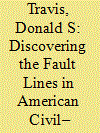

|
|
|
|
|
| Summary/Abstract |
This essay is in response to Thomas Crosbie and Meredith Kleykamp’s article that investigates relationships between what they consider to be three fault lines in the American military profession: ethical lapses, expertise, and identity. As they explore the literature to contemplate how professionalism might help to prevent ethical lapses, they also seek to reveal relationships between lapses, military expertise, and identity. To enhance the relevance of their research, it is recommended that they examine ethical lapses more broadly. Their core subject is American civil–military relations, which is a complex, contentious, and often ambiguous topic. They can mitigate the ambiguity by developing a clear problem statement and a set of research assumptions. In addition, because not all lapses are treated the same, they can be categorized to identify more serious lapses, which will allow for a focused examination of institutional responses to the lapses. Also, integrating other academic approaches such as political science and history into their research will improve the theoretical and explanatory power of their investigation. Adopting these and other aspects of inquiry will support the testing of their six hypotheses and improve our understanding of the military profession.
|
|
|
|
|
|
|
|
|
|
|
|
|
|
|
|
| 5 |
ID:
161546
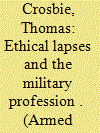

|
|
|
|
|
| Summary/Abstract |
In a recent issue of this journal, we published an article titled “Fault Lines of the American Military Profession”. Donald S. Travis subsequently wrote a Dipustatio Sine Fine rejoinder that raised a number of criticisms of our piece and suggested several ways forward. For our part, we detect three serious problems in Travis’s analysis and offer a single syncretic response. Our solution builds on the insights of Travis’s critique while avoiding the pitfalls of his specific line of reasoning. We conclude by urging others to continue to debate and research these very consequential and timely issues.
|
|
|
|
|
|
|
|
|
|
|
|
|
|
|
|
| 6 |
ID:
161537


|
|
|
|
|
| Summary/Abstract |
This Armed Forces & Society forum concentrates on broadening the perspective on military cohesion. This introduction, and the five articles that it acts as a preamble to, argues for the need to widen the scope of the recent debate on military cohesion, which in part took place in this very journal. This debate narrowly focused on Western state militaries during the 20th and 21st centuries and even then on the microlevel. The articles in this issue contribute to this broadening by exploring military cohesion in non-Western or nonmodern contexts, as well as through new methods, thus individually and collectively suggesting new ways forward to further our understanding of military cohesion.
|
|
|
|
|
|
|
|
|
|
|
|
|
|
|
|
| 7 |
ID:
161540
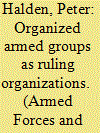

|
|
|
|
|
| Summary/Abstract |
Previous studies of the cohesion of organized armed groups (OAGs) have made great progress, but they have mostly focused on units fighting for modern Western states. I argue that the study of OAGs that contain their own legitimacy requires a broadened theoretical framework. Such groups may be conceptualized as “ruling organizations” in Max Weber’s terminology. Examples of such groups range from early medieval warbands to modern militias and guerrillas. Members of ruling organizations obey commands for a combination of three reasons: rational, traditional, and charismatic—these in turn form the basis of the legitimacy of the organization. Pinpointing the foundations of obedience in a group provides us with another way of emphasizing weak points that we want to either target or reinforce. This study contributes theoretically to the study of cohesion by linking it to theories of legitimacy in political orders.
|
|
|
|
|
|
|
|
|
|
|
|
|
|
|
|
| 8 |
ID:
161542
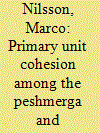

|
|
|
|
|
| Summary/Abstract |
This study analyzes the creation of primary unit cohesion among the Kurdish Peshmerga soldiers fighting the Islamic State in northern Iraq and among Hezbollah fighters active in Syria. For this comparative study, Kurdish soldiers were interviewed on three fronts outside Mosul, Erbil, and Kirkuk in February 2015 and May 2016, and Hezbollah fighters were interviewed in Lebanon in March 2016. In contrast to many studies’ depictions of unit cohesion as relating to shared experiences of training and battle, this study argues that the Kurdish soldiers also import into their units various ideas relating to Kurdish identity. These include ideas about nationalism and religion produced through discourses within the Kurdish military and society. However, Hezbollah seeks to minimize political damage in the multisectarian political context in Lebanon while conducting domestically contested military operations abroad. This has led to a downplaying of the sectarian aspects of the conflict, which could be imported from the Shia community to increase unit cohesion, and to an ideological framing of the conflict. The general ideas circulating in society and the political context therefore matter for the strategies that can be used to increase primary unit cohesion and soldiers’ fighting power.
|
|
|
|
|
|
|
|
|
|
|
|
|
|
|
|
| 9 |
ID:
161541
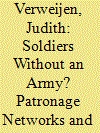

|
|
|
|
|
| Summary/Abstract |
This article analyzes the effects of patronage networks on cohesion in the Armed Forces of the Democratic Republic of the Congo. It shows that while patronage networks provide support to individual military personnel, they undermine both peer and commander–subordinate bonding. They promote unequal service conditions and statuses and link these to extra-unit and extra-military forms of social identification, which are further reinforced by soldiers’ living and generating revenue among civilians. Furthermore, they impair meritocracy and frustrate the extent to which commanders live up to their subordinates’ expectations. As they fuel internal conflicts, often around revenue generation, and foster bad service conditions and distrust toward the political and military leadership, patronage networks also undermine institutional cohesion. The article concludes that cohesion formation in the FARDC follows different patterns than in well-institutionalized and well-resourced militaries. Given that cohesion impacts combat performance and norm enforcement, these findings are relevant for defense reform efforts and military cooperation.
|
|
|
|
|
|
|
|
|
|
|
|
|
|
|
|
| 10 |
ID:
161539
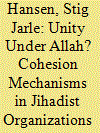

|
|
|
|
|
| Summary/Abstract |
This article explores mechanisms fostering cohesion in jihadist organizations in relation to territorial presence. This article takes four types of territorial presence as its point of departure: (1) a clandestine network-based presence; (2) an accepted presence where the organization is tolerated by a state; (3) a semiterritorial presence, where the organization is allowed some control between phases of enemy offensives and withdrawals; and (4) a relatively permanent territorial presence, where the organization fully controls the territory in which it has bases. The article argues that each of these types of territorial presence opens up for different ways for organizations to create cohesion. Cohesion mechanisms thus vary according to type of territorial presence.
|
|
|
|
|
|
|
|
|
|
|
|
|
|
|
|
|
|
|
|
|